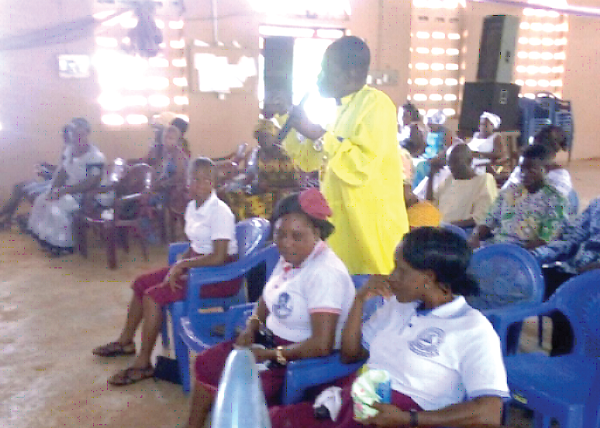
Lower Manya NCCE educates public on tax payments
The Principal Civic Education Officer of the Lower Manya Krobo National Commission for Civic Education (NCCE), Ms Elizabeth Tetteh, has stressed the need for citizens in the municipality to honour their tax obligations for the assembly to generate enough revenue for development.
She said as much as citizens needed development projects in their respective electoral areas and the Lower Manya Municipality as a whole, it behoved them to pay their levies and property rates to enable the assembly to perform its mandated functions.
“The Lower Manya Krobo Municipal Assembly has its mandated functions to perform in the interest of people in the area, however, we, the citizens of the area and all other people who are doing one business or the other in the municipality must also play our part by way of payment of our little levies which when put together, the assembly can use to perform its duties as stipulated in its annual budget,’’ the NCCE officer stressed.
Working visits
Ms Tetteh made the remarks when a team of officers from the commission paid a working visit to some organisations, churches and mosques in the municipality.
Other members of the team included Messrs Joshua Kpordzi and Michael Agyekum, both civic education officers.
The visits took the team to artisans, officials of Ghana Private Roads Transport Union (GPRTU), tailors and dressmakers associations, hairdressers and beauticians associations, associations of garages and market women, among others.
The public education was aimed at creating awareness on corruption and the Whistle Browers Act.
At most of the places visited, it was alleged that officials of the Lower Manya Krobo Municipal Assembly contributed to low revenue generation which to a large extent amounted to corrupt practices which was not helping the assembly.
According to most of the people who made the allegation, revenue collectors who normally went round to collect levies and artisan fees told some of them to pay half of the amount they owned without receipts which eventually went into the pockets of the revenue collectors.
The civic education officers in response stressed the need for citizens not to condone such corrupt practices and insist on their civic rights as citizens of Ghana, adding “the law frowns on corruption and nobody is above the law.’’
NCCE schools education
In a related development as part of NCCE Citizenship Week celebration, the commission visited a number of basic schools in the Akuse Circuit of the Ghana Education Service in the municipality and educated schoolchildren on the need to keep the environment clean devoid of filth.
The programme was on the theme: ‘’The Environment and You.’’
An Assistant Civic Education Officer, Mr Josua Kpordzi, who led the team, explained to the pupils the relationship between the citizens and the environment and how as Ghanaians they must work hard to ensure good environmental sanitation for the sustenance of democratic principles.
He said the upsurge of indiscipline among school-age children in the country manifested in practices such as disrespect for the environment through littering with empty water sachets, used polythene bags/materials, other plastic waste and the indiscriminate disposal of both solid and liquid waste, as well as open defecation at the beaches and around the communities.
Quoting Article 41 of the 1992 Constitution on duties of citizens, he advised the pupils to obey the local and national laws on environmental sanitation, protect and safeguard the environment, keep their environment clean, desist from throwing refuse into gutters, and put a stop to open defecation in their communities.
They were also asked to keep their homes clean, participate in clean-up exercises and above all respect and obey school rules and regulations on sanitation and hygiene.
The school prefect of Akuse Islamic Junior High School, Master Abdulai Hassan, thanked the NCCE staff on behalf of his colleagues and said the programme had added up to the stock of knowledge they had on environmental cleanliness and they would make it a habit to keep their school and the communities always clean.
